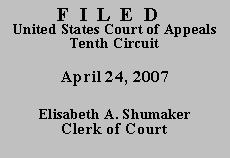

| UNITED STATES OF AMERICA,
Plaintiff - Appellee, v. AUGUSTINE CRUZ-LOPEZ, Defendant - Appellant. |
No. 06-4058
(D.C. Nos. 2:06-CV-104-TC and 2:04-CR-252-02-TC) (Utah) |
Mr. Cruz-Lopez filed a § 2255 petition in district court claiming ineffective assistance of counsel. The district court denied this petition, noting that Mr. Cruz-Lopez declared his understanding of the plea agreement in advance of his guilty plea and waived his right to collaterally attack his sentence under § 2255. In accordance with 28 U.S.C. § 2253, he now seeks a COA to appeal the district court's denial of his petition. Miller-El v. Cockrell, 537 U.S. 322, 335 (2003). Issuance of a COA is jurisdictional. Id. at 335-36. A COA can issue only "if the applicant has made a substantial showing of the denial of a constitutional right." 28 U.S.C. § 2253(c)(2). "A petitioner satisfies this standard by demonstrating that jurists of reason could disagree with the district court's resolution of his constitutional claims or that jurists could conclude the issues presented are adequate to deserve encouragement to proceed further." Miller-El, 537 U.S. at 327.
First, Mr. Cruz-Lopez asserts a United States v. Booker, 543 U.S. 220 (2005), claim that he acknowledges has "heretofore not been raised." Aplt. Br. at 4. As this issue was not raised before the district court, it is waived. Wares v. Simmons, 392 F.3d 1141, 1143 (10th Cir. 2004).
Second, Mr. Cruz-Lopez asserts he has been denied transcripts and records necessary for the development of his habeas petition. As we noted in a previous appeal, "[Mr.] Cruz-Lopez must file a separate motion in his § 2255 proceeding" to obtain these documents. United States v. Cruz-Lopez, No. 05-4263, 2006 WL 895494 at *1 (10th Cir. Apr. 7, 2006). There is nothing in the record to suggest Mr. Cruz-Lopez made such a motion in these proceedings.
Third, he argues his counsel was ineffective in recommending he accept a plea agreement. Although an ineffectiveness claim with respect to a plea agreement is not barred by an otherwise valid waiver, see United States v. Cockerham, 237 F.3d 1179, 1184 (10th Cir. 2001), Mr. Cruz-Lopez provided no factual support in his petition for his assertion that counsel was ineffective in advising him as to his plea agreement. He asserted only that his counsel "failed to provide me with the documents that would help me to understand my plea agreement." Rec., vol. I, Motion at 5. As the district court noted:
However, when Mr. Cruz-Lopez' executed his Statement in Advance of Plea of Guilty, he represented to the court: "I have discussed this case and this plea with my lawyer as much as I wish to. I am satisfied with my lawyer. My decision to enter this plea was made after full and careful thought, with advice of counsel, with a full understanding of my rights, with a full understanding of the facts and circumstances of the case an with a full understanding of the consequences of this plea . . . ."
Id., Order at 2. We are at a loss to understand what "documents" counsel could have provided Mr. Cruz-Lopez to help him understand his plea agreement.
Finally, Mr. Cruz-Lopez contends the district court erred in applying a "procedural bar of the 1-year limitations statute." Aplt. Br. at 6. Contrary to this assertion, the district court order included no mention of a statute of limitations.
Mr. Cruz-Lopez has not demonstrated that jurists of reason could disagree with the district court's resolution of his constitutional claims. Accordingly we DENY his request for a COA.
ENTERED FOR THE COURT
Stephanie K. Seymour
Circuit Judge
*.This order is not binding precedent, except under the doctrines of law of the case, res judicata, and collateral estoppel.
1. We liberally construe Mr. Cruz-Lopez's pro se application. See Cummings v. Evans, 161 F.3d 610, 613 (10th Cir. 1998).